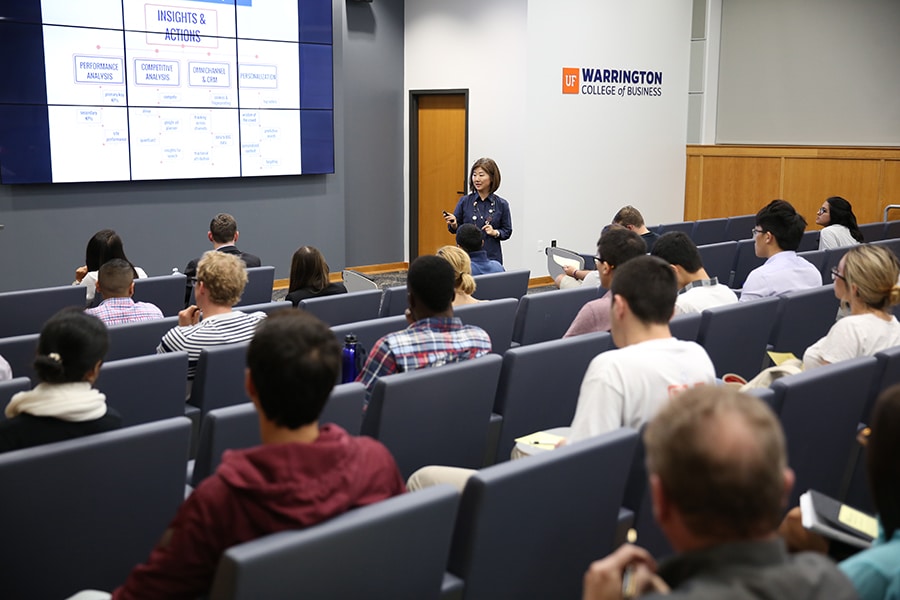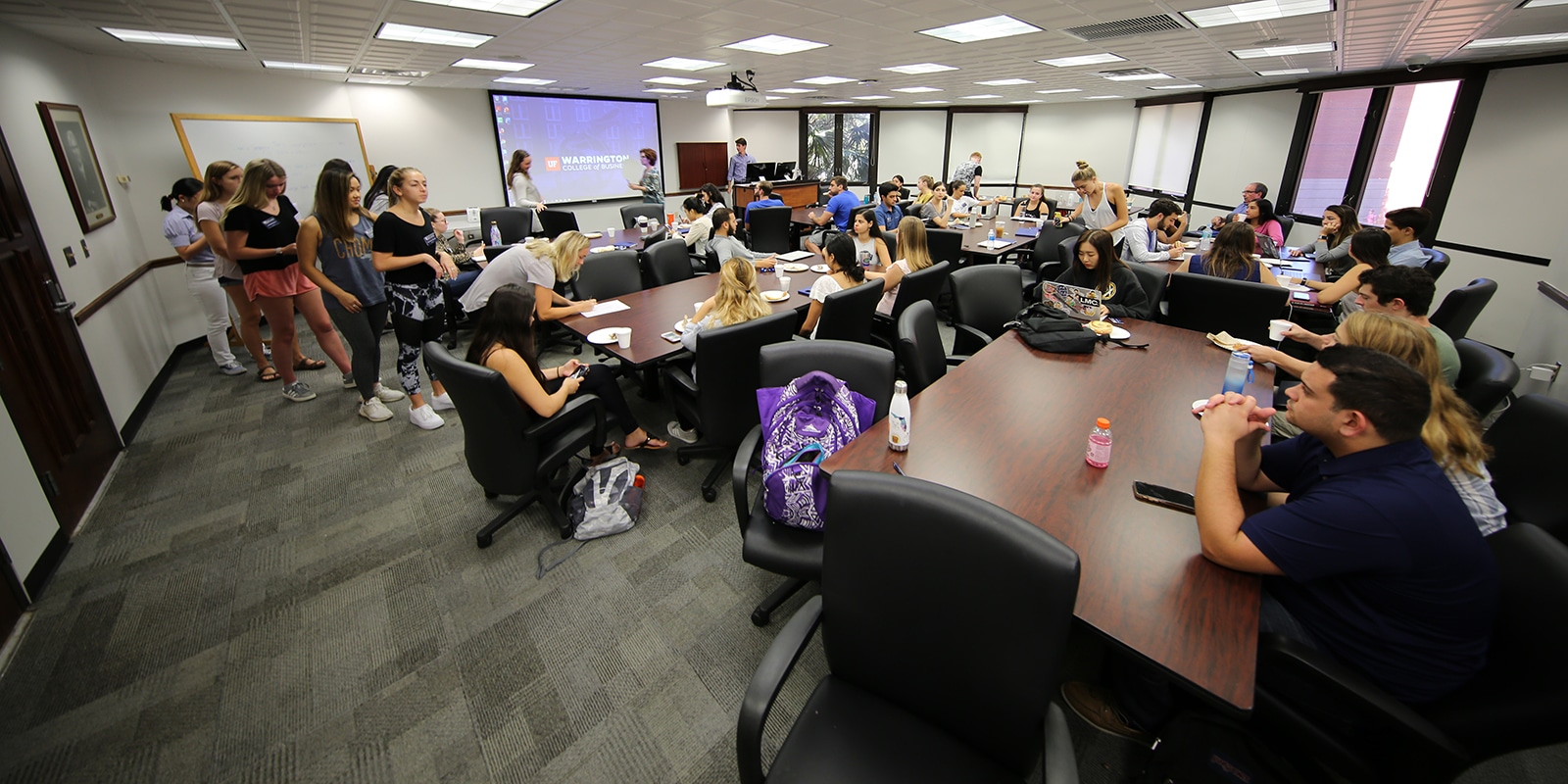
David F. Miller Retail Center
The key to unlocking consumers
Defined by constant adaptation, the retail sector is predicated on consumer patterns. Decades ago, keeping abreast of trends was the secret to more engaging advertisements and store displays.
Today, artificial intelligence, immersive multiplatform experiences, and automation shape every stage, from merchandising and product design to inventory management.
Through research and programming, the David F. Miller Retail Center plugs into all aspects of our dynamic, globe-spanning field to position University of Florida Warrington College of Business students for executive-level management, analytical, and more roles that blend data with creativity and business savvy.
To forge a pathway, we maintain relationships with an extensive network of retail leaders who tell us about the talent they bring on, the skills crucial for success and emerging developments. This insider’s perspective sets the tone for our center’s offerings: courses and a minor with a practical look at the industry, networking and professional development events that emphasize key career qualifications, and a direct recruitment pipeline to some of the most recognizable brands.
Interested in getting involved? Whether you’re a student or professional, see what we’re all about and explore our programs and events held throughout the year.
About the retail center
The Miller Retail Center was founded in 1988 by former JCPenney vice chairman and Warrington alumnus David Miller (BSBA ’51). The center is one of just three business school-based retail centers in the country.

Our alumni
The center’s programs have helped the University of Florida produce some of the brightest minds in the retail industry, including Debbie Ferree (Vice Chairman and Chief Merchandising Officer for DSW) and Steve Knopik (CEO of Bealls).

Retail Smarter Conference
The UF Miller Retail Center’s annual Retail Smarter Conference is a two-day event that brings together a diverse group of industry experts. It hosts speakers, panels, roundtables, and networking opportunities while discussing trends, best practices, technology, supply chain and human resources.

Research
Our center’s research helps retailers effectively harness emerging technologies to grow engagement, increase sales and translate trends into tangible products.
The retail center at a glance
This is where future merchandisers, buyers, managers and marketers get their start.
4,000+
Students placed in full-time careers, and 6,500+ students connected with internships since the center’s founding.
#1
Student recruitment source for over 50 retailers, including Macy’s, JCPenney, Bealls, Walgreens and Bridgestone.
200+
Students find internship placements, and 130-150 find full-time professional retailing positions through the center.
Retail minor and courses
Retailing begins with consumers — their interests, their habits, and the products and experiences that fit their lifestyles. The center’s courses frame business principles in this context to graduate well-rounded, entry-level professionals accustomed to the industry’s processes, technologies and expectations.
Retailing minor
Learn to procure materials, merchandise products, and draw upon data to develop promotional strategies and innovative, appealing concepts, all with opportunities to interact with leading retail professionals.
MAR 2290 — Sears Holdings Retail Management Seminar
Each semester, the Miller Retail Center presents an exciting lineup of speakers from positions in store management, buying and planning who are ready to talk about the latest topics in retailing. Discussions of career opportunities and career paths are included.
MAR 3231 — Introduction to Retail Systems Management
Understand all the strategic and operational decisions involved in running retail firms and interfacing companies, their underlying business concepts and principles, and the variety of professional roles required for effective execution.
Student organizations and activities
Curious about the workings of an e-commerce storefront, a brand’s social media presence or a stage of the supply chain? The center’s organizations and activities offer exposure to all related roles and the people behind the brands and products everyone knows.

The Retail Society
Know who to talk to about finding an internship, get job search tips from professionals and your fellow students and think about the careers you intend to pursue in the retail field.

Retail management internship
The Retail Management Internship allows students to actively apply their academic experiences to management positions during the summer months. Participating students are supervised, visited, and guided by Miller Center staff during their assignments and invited to take part in the annual Retailing Smarter Symposium.

Student advisory board
Consisting of individuals who have recently completed the Retail Management Internship, Student Advisory Board members serve as ambassadors for visiting retail companies and actively educate their peers about related careers through public speaking, seminar support, assembly representation and thought leadership.
Interview with Matt Beall, CEO of Bealls Inc.
Opening doors to the retail industry

“The Miller Center opened the door into an industry that I didn’t think was possible to get into. Not only that, but they also made it incredibly easy for me to become a part of this industry. The Miller Center offers so many opportunities that are all geared to help you succeed, and everyone there works hard to help you land the internship of your dreams. The Miller Center changed my life, and it can change yours, too!”
Kimberly Nguyen (BSBA ‘18, MIB ‘18)
Career resources
Craft a captivating post for a limited-edition collection. Build bonds (and contracts) with vendors to increase product selection and sales. Or track clicks to present browsing users with what they’re after, every stage of their journey.
Retail career opportunities occur in merchandising/buying, store management and corporate staff functions. Corporate positions are found in such areas as accounting, finance, promotions and advertising, information and distribution systems, and human resource management.
Retail corporate staff
The corporate staff positions in retail firms require knowledge, skills and abilities similar to those in comparable positions in non-retail firms. Thus, many managers in these positions identify with their profession rather than the retail industry. Similarly, accountants in retail firms view themselves as accountants, not as retailers.
Management information systems
Employees in this area are involved with applications for capturing data and developing and maintaining inventory. Management of the retailer’s systems — such as POS terminals, websites, customer databases, self-checkout systems and in-store kiosks — is an additional facet.
Supply chain management
Supply chain management operations employees are responsible for operating and maintaining the store’s physical plant, for providing various customer services, for the receipt, ticketing, warehousing, and distribution of a store’s inventory, and for buying and maintaining store supplies and operating equipment.
Marketing/communications
Many aspects include public relations, advertising, visual merchandising and special events. This department attempts to build the brand image and encourage customers to visit stores and/or the website. Managers in this area typically major in marketing or mass communications.
Real estate
Real estate divisions are responsible for selecting locations for stores, negotiating leases and land purchases, and managing leasehold costs. Students entering this area typically major in real estate or finance.
Finance/control
The finance/control division is responsible for the financial health of the company. They prepare financial reports for all aspects of the business, including long-range forecasting and planning, economic trend analysis and budgeting, shortage control and internal audit, gross and net profit, accounts payable to vendors and accounts receivable from charge customers. In addition, they manage the relationship with the financial community.
Human resource management
Responsibilities include the effective selection, training, placement, advancement and welfare of employees. Because there are seasonal peaks in retailing (such as Christmas, when many extra people must be hired), human resource personnel must be flexible and highly efficient.
Retail store management
The typical entry-level retail store management position is a department manager, who is responsible for merchandise presentation, customer service and inventory control for an area of the store.
The next level is an area or group manager responsible for executing merchandising plans and achieving sales goals for several areas, as well as supervising, training, and developing department managers. After these positions, they can be promoted to store manager, then a district manager responsible for a group of stores, and eventually a regional manager responsible for a group of districts, or they may be eligible for a corporate position.
Retail merchandise management
Retail merchandise management attracts people with strong analytical capabilities, an ability to predict what merchandise will appeal to their target markets, and a skill for negotiating with vendors, as well as store management.
Retail merchandise buyers invest in a portfolio of merchandise, monitor the performance and make purchase decisions based on sales. Buyers are responsible for selecting the type and amount of merchandise to buy, negotiating the wholesale price and payment terms with suppliers, setting the initial retail price for the merchandise and monitoring merchandise sales to make appropriate retail price adjustments.
The typical entry-level position for college graduates interested in retail merchandise management is either assistant buyer or assistant planner in a merchandise category, such as men’s athletic shoes or accessories for consumer electronics.
Sales clerk is the entry-level job in retailing
Most students and their parents think that people working in retail have jobs as sales clerks and cashiers. They hold this view because, as customers in retail stores, they typically only interact with sales associates and not their managers. But, as we have discussed, retail firms are large, sophisticated corporations that employ managers with a wide variety of knowledge, skills and abilities. College and university graduates are typically given entry-level positions as management trainees in buying or store organizations, not as sales associates.
Management trainees in retailing are given more responsibility more quickly than in other industries. Buyers are responsible for choosing, promoting, pricing, distributing and selling millions of dollars worth of merchandise each season. The department manager, who is generally the first position after a training program, is often responsible for merchandising one or more departments, as well as for managing 10 or more full- and part-time sales associates.
College degrees are not needed to succeed in retailing
While some employees are promoted based on their retail experience, a college degree is needed for most retail management positions, which range from store manager to CEO. Over 150 colleges and universities offer programs of study and degrees or majors in retailing.
Are retail jobs low-paying?
Starting salaries for management trainees with a college degree range from $35,000 to $45,000 a year for entry-level store and merchandise management and $60,000 for students with specialized master’s degrees.
However, the compensation of top management ranks among the highest in any industry. For example, store managers with only a few years of experience can earn up to $100,000 or more, depending on performance bonuses. A senior buyer for a department store earns from $50,000 to $90,000 or more. A department store manager can earn from $50,000 to $150,000; a discount store manager makes $70,000 to $100,000 or more; and a specialty store manager earns $35,000 to $60,000 or more.
Retailing is not a low-growth industry with little opportunity for advancement
While the growth rate of retail parallels the growth rate of the overall economy, many opportunities for rapid advancement exist simply because of the rapid growth of many chains and the sheer size of the retail industry. Thirty years ago, Walmart, Home Depot, Starbucks and Best Buy were small companies.
Work with the retail center
You’re after tech-minded, take-charge employees — and we have a pool of candidates interested in what you offer. Help us cultivate tomorrow’s talent by participating in our speaker series and mentorship programs and sponsoring the activities we schedule throughout the year for the Warrington community.

Support the Miller Retail Center
Support the opportunities the center provides to students by making a donation online through the UF Foundation.
The latest retail news
Center events

A real-time look at retail
Shed yesterday’s tactics to refresh your skills and your workforce for today’s retail landscape.


